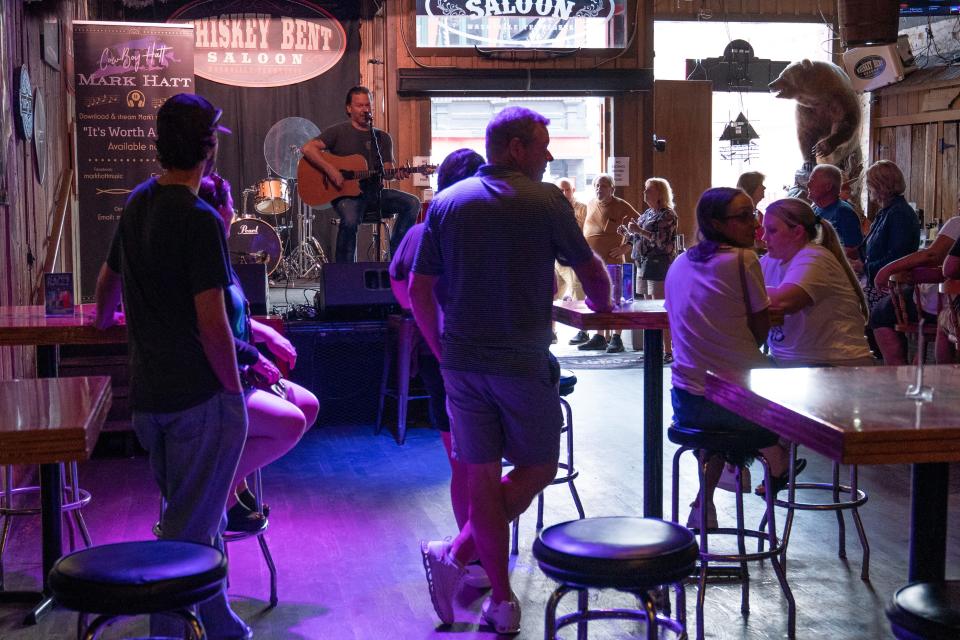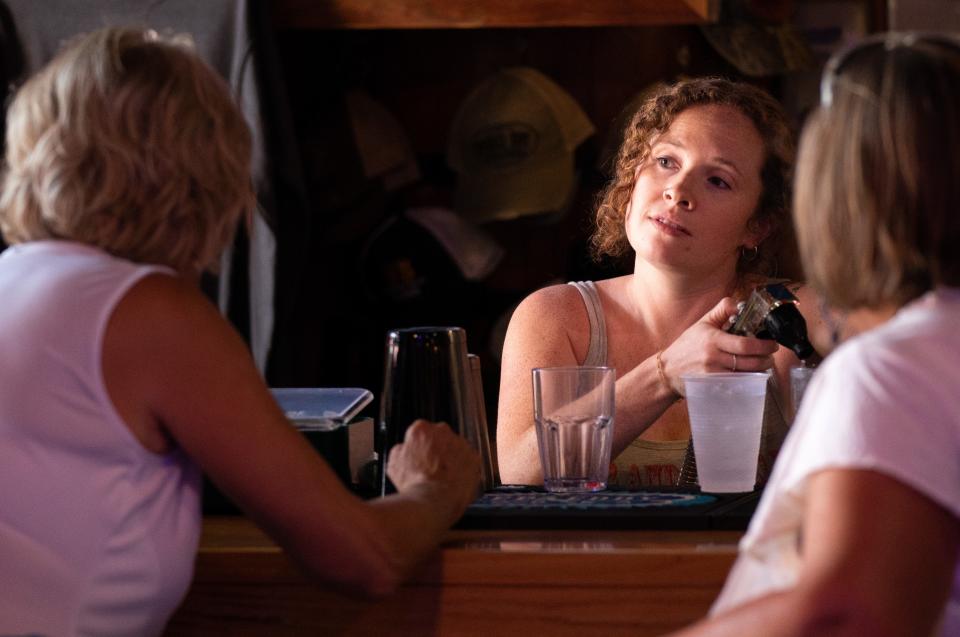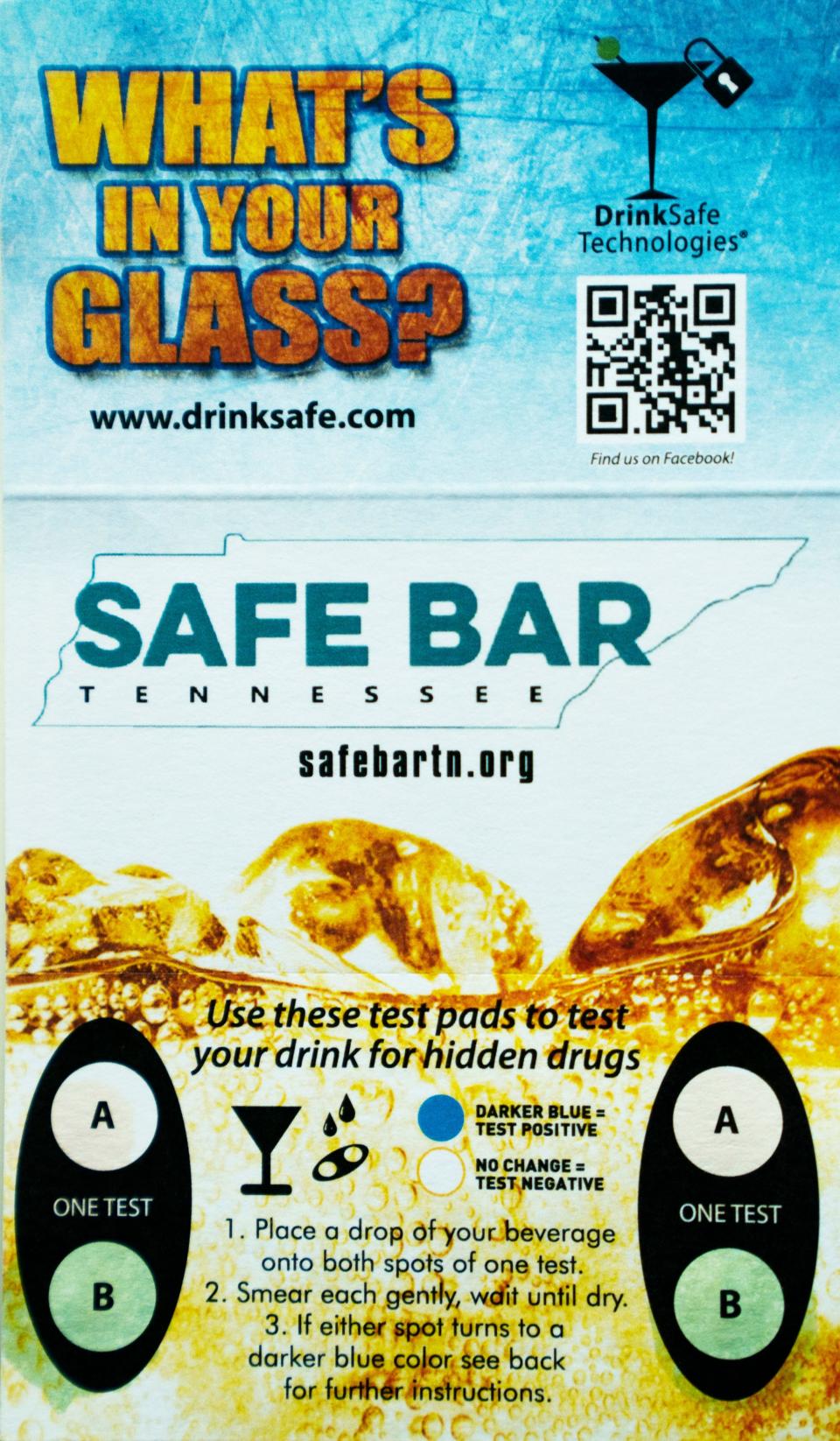Why Nashville advocates worry rise in date rape drug cases could be start of an 'epidemic'
Editor's note: This story contains details of sexual assault. If you or someone you know is a victim of sexual assault, you can call the National Sexual Assault Hotline at 800-656-HOPE (4673).
In August, Jessica Cardoza was celebrating her 40th birthday with a girlfriend at a honky-tonk on Lower Broadway when a man at the bar offered to buy her a drink.
Cardoza sipped the drink as she chatted with the man for a few minutes and then went to look for her friend on the dance floor.
It’s the last thing she remembers of that night.
She woke up in a daze the next morning in the man’s apartment, her body covered in bruises.
Her neck had a ring of bruises like someone had choked her. Her chest felt like it had been crushed, as if someone had lied on top of her with all of their weight.
Terrified, Cardoza fled the man’s apartment and called an Uber.
She then called her friend, who said Cardoza had disappeared from the dance floor and didn’t answer repeated calls and text messages.
“I was in shock,” she said. “That’s just not me. It’s not something I would ever do. I wasn’t drunk before that last drink, and I’m not a big drinker. I know my limit.”
Cardoza said this was something different.
“One minute I was there and the next minute I was gone,” she said. “It was like nothing I’ve ever felt before.”
Cardoza believes her drink was drugged. Her story isn’t uncommon.

The Sexual Assault Center in Nashville says it has seen an alarming increase in the number of rape victims who believe they were drugged while out at the city’s bars and nightclubs.
The increase is so concerning that the center late last year changed its patient forms so it could begin tracking the numbers, which revealed some shocking statistics.
Of 180 victims who received sexual assault exams at the center between January and August of this year, nearly 25% said they believed they were drugged. More than 17% said they didn’t know whether they were drugged.
The highest number so far was in April, when nine out of 23 people who visited the center for an exam said they were drugged.
Kate Snodgrass, a victim advocate at the center, said their stories are all similar.
“They say things like, ‘I don’t know what happened to me. This is the last thing I remember. I can drink a lot more than that,’” Snodgrass said. “It got to the point where we were seeing so many cases that we had to add it into our paperwork.”
“It’s beginning to be an epidemic here,” she said.
The center since 2018 has been pushing to raise awareness with its Safe Bar program, which works with local bars and restaurants to educate staff on their role in preventing sexual violence.
But so far, only one bar on Lower Broadway — Nashville’s famous row of tourist-packed honkey-tonks — has participated.
Victim advocates say it’s hard to know the true scale of the problem since most cases go unreported. And those who do seek help are often met with a confusing maze of bureaucracy.
Hospitals don’t have a uniform protocol for testing victims for so-called date rape drugs, and the cases are tough to prove and prosecute as the drugs can quickly leave someone’s system before they’re detected.
In Cardoza’s case, she said she went to an emergency room near her home in Spring Hill, where she waited for three hours before staff told her they didn’t know how to perform a test for rohypnol, a common date rape drug.
They told her she would have to go back Nashville, about an hour away, if she wanted to receive a sexual assault forensic exam and file a police report.
Cardoza went to the Sexual Assault Center on the city’s northside, but by that time, the 12-hour window had passed for any common date rape drug to show up in her system.
Frustrated and exhausted, she chose not to file a police report.
“I feel like the system isn't designed for women in that type of a situation who are under the influence of a drug and don't have memories of exactly what happened,” she said. “How can I prove anything?”
After that night, Cardoza had to take weeks off of work because of the bruising on her body. She still has trouble sleeping and is seeing a counselor for post-traumatic stress.
While The Tennessean normally does not name victims of sexual assault, Cardoza wanted to use her real name with the hopes that sharing her story could help other women.
A push for safer bars
Known as the world’s bachelorette party capital, Nashville sees millions of tourists each year, many of them women drawn by the music scene and the town’s safe reputation.

But like many cities with booming nightlife, Nashville has seen its share of reports of people whose drinks were spiked with drugs while on a night out.
In May, two Chatanooga men were accused of drugging, kidnapping and raping an 18-year-old college student they met at a bar on Broadway. The case is pending before a grand jury, according to Davidson County court records.
And it’s not just women.
Male tourists this year have also reported being drugged and robbed after talking to women in bars. Metro Nashville Police detectives were investigating the cases.
The nationwide problem has been around since at least the 1990s, when cases first started being reported in the media.
But victim advocates worry that the recent rise is possibly due to some drugs becoming more widely available, like ketamine, an aesthetic that’s now popular as an antidepressant.
The Sexual Assault Center hopes to idenifty trends now that it’s tracking the numbers of people who say they’ve been drugged.
In the meantime, it’s pushing the Safe Bar program, which was recently revamped with a new app and got an extra $75,000 in funding from the city this year.
To become “safe bar certified,” bar staff must participate in a two-hour video or in-person training. They also get assistance and resources, like special drink coasters that can detect ketamine and GHB (gamma hydroxybutyrate), two of the most common date rape drugs.

It’s a free and simple program. But still, only about a dozen bars around Nashville are safe bar certified, and just one — the Whiskey Bent Saloon — is on Lower Broadway.
Whiskey Bent General Manager Erin Johnson said he jumped at the chance to get his bar certified when center staff approached him about a year ago.
“To me it was a no-brainer,” he said. “We wanted that extra level of safety for our customers.”
Lorraine McGuire, vice president of development and marketing for the center, said other bar owners along Lower Broadway have shown interest, but none have followed through.
“They see it as a hassle,” she said. “They know right now they’re not going to lose money for not doing it. If the public pressure gets strong enough or there’s enough PR, then maybe they’ll do it.”
Steve Smith, owner of several Broadway honkey-tonks, including the famous Tootsie’s Orchid Lounge, said he’d never heard of the Safe Bar program, but he’d be open to participating.
Though, Smith said he has an excellent security staff and doesn’t believe that people slipping drugs in drinks is a problem along Broadway.
“We’d take some of those drink coasters,” he said.
The Nashville Convention & Visitors Corp. said it’s working with the Sexual Assault Center to encourage bars, restaurants and hotels to participate in the program. It also distributes the free drink coasters at its two downtown visitor centers.
The organization noted that police now have a stronger presence downtown with a new entertainment district unit and will soon open a substation on Lower Broadway.
“The safety of Nashville residents and visitors is our top priority, and we never want anyone to be victimized downtown or anywhere in our city,” President and CEO Deana Ivey said, in a statement.
Gracie’s story
Nashville singer-songwriter Gracie Carol decided to tell her story on TikTok after a horrifying experience where she believes she was drugged but couldn’t get a test at a local hospital.
She never expected to go viral.
“I’m pretty sure I got roofied. I don’t remember any of it,” she starts in the video. “I never do this. I wanna let you guys know what happened to me this weekend.”
As of May, Carol’s post had nearly 2 million views and more than 3,600 comments, many from women who shared similar experiences.

In an interview, Carol, 26, said she was shooting social media content with a girlfriend at a rooftop hotel bar in the downtown area in May when a man offered her a shot.
Carol said she’d only had about two drinks that evening and wasn’t drunk, so she took the shot. She doesn’t remember much after that.
She later learned that the bar staff called an ambulance after she passed out at the bar. Her friend followed the ambulance in an Uber.
At the hospital, she was treated for alcohol intoxication but she said doctors never tested her for drugs.
Worried that the same man was targeting other women, Carol said she tried to file a police report but was told she would need proof that she was drugged.
She then went to a second hospital for a drug test but was told that any drugs would likely be out of her system and that no tests were available. She said she was told to “sleep it off.”
“I felt so defeated,” Carol said. “Nobody wanted to help.”
Carol, who has lived here for about eight years and was a regular performer on Lower Broadway, said hospitals should have a uniform protocol for date rape drug testing.
“It should not be this hard to get drug tested for these things, especially for women in Nashville,” she said. “They should have been able to help me.”
One city on the East Coast is pushing for that change. In Boston, sexual assault survivors are supporting a bill that would require hospitals statewide to test for date rape drugs.
Tennessee doesn’t yet have such a requirement, and the protocols can vary.
At Vanderbilt University Medical Center, for example, a patient can receive a full toxicology test but they must first report their case to law enforcement.
The Sexual Assault Center will test for the drugs if the incident occurred within a 12-hour window, when the drugs are most likely to still be in the person’s system.
The Metro Nashville Police Department does not track statistics on the number of sexual assault victims who were drugged nor does it track incidents of drugging at bars, but it does track fatal/nonfatal overdoses, said spokesperson Kristin Mumford.
The situation can be more complicated if a person believes they were drugged but not sexually assaulted, like in Carol’s case.
In that case, Mumford said a perpetrator could be charged with aggravated assault. But it’s rare.
Raising awareness
In addition to trying to raise awareness at bars and restaurants, the Sexual Assault Center says it’s hoping to work with local Airbnb owners, Uber drivers and companies that organize bachelorette parties for greater outreach.
The center also has a sexual violence awareness program for the music industry called Safe Tracks.
Staff at the center said they have seen the names of some bars popping up more frequently with victims. McGuire said the center is legally prohibited from naming those places publicly, but they share that information with law enforcement.
Snodgrass, the victim advocate, said one of the best things people can do is stay vigilant.
She also works as an Uber driver on the weekends and said she’s constantly telling her customers to hold their drinks at their chests and be mindful of their surroundings.
“You don’t need to live in fear, you should be able to go out and have fun,” she said. But we do live in a time where we have to do it safer and smarter. You constantly need to have your guard up.”
For more information, visit the Sexual Assault Center at sacenter.org.
What are date rape drugs and how do they affect the body?
The most common date rape drugs are flunitrazepam (Rohypnol), gamma-hydroxybutyric acid (GHB), gamma-butyrolactone (GBL) and ketamine.
These drugs can be slipped into someone’s alcoholic drink to increase the effects of intoxication.
The signs in the body are similar to alcohol intoxication and can include dizziness, slurred speech, nausea or vomiting, confusion and passing out.
Tell us your story
Has this happened to you in the Nashville area? Tennessean reporter Kelly Puente would like to hear your story. You can reach her by email at kpuente@gannett.com or direct message @KellyPuenteTN
This article originally appeared on Nashville Tennessean: Nashville cases involving date rape drugs are rising. Are bars safe?

